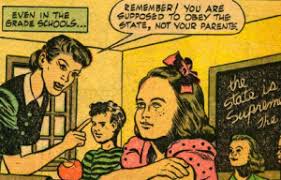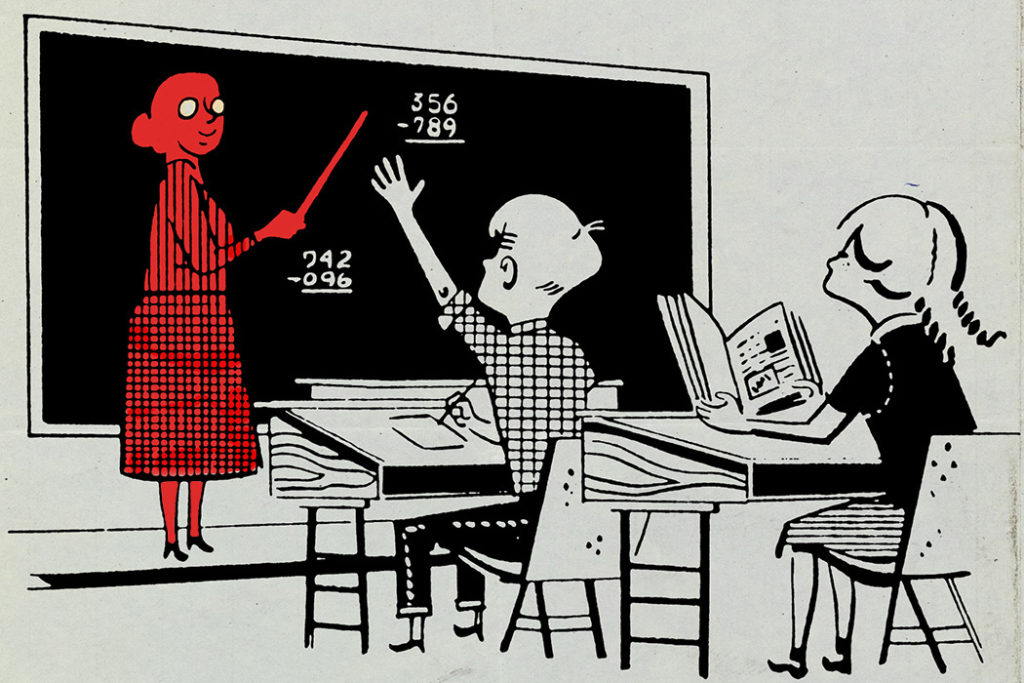I never aspired to be the Enemy of the People.

But here it is in 2021, and here I am, a part of the ever lengthening list of people tearing this country apart.
I say this with a smirk, but only partly in jest. Ever since DJTJ called out my profession for being “loser teachers that are trying to sell you on socialism…”, I’ve had my ear to the ground to see if this herd is gathering steam in my direction. When the son of the (now outgoing) President and his sympathizers start calling you out as a group that everyone should hate, that everyone should rally against, you take stock. Anti-teacher political rhetoric is nothing new, but being labeled as the potential downfall of the Republic–while flattering–can put a nice little metaphorical crosshair on your back in some already tense times. That’s the type of indoctrination I need to watch out for.
In the last few months, quite a few people who know me, some who I have considered my close friends at times, have turned their vitriol towards my profession in general and me as a teacher specifically. There’s an undercurrent in this country that seems to believe that we are raising children to hate America, to hate freedom, to give fealty to our encroaching communist overlords. As I watched raw footage on the ground from last week’s Rally turned Riotous Insurrection, the schools were right up there with CNN as the boogeymen bringing this once great country to its knees.
Sometimes, I wonder without any seriousness which teachers they are talking about. I don’t usually give this much thought, but an email from a student last week set my mind in this direction. A bit of context: in my philosophy class last semester, I selected Mill’s On Liberty as the basis of discussion. Given that we were going into what proved to be one of the most discussed, analyzed, and contested elections ever in my lifetime, it seemed a good choice to study the book that lays the foundations of so much how we talk about free speech, discourse of ideas, and liberty in a modern society. It’s not the kind of thing you indoctrinate people with to bring about a glorious communist revolution. It’s certainly not “socialist” as DJTJ and others seem to claim. If anything, Mill’s arguments can be construed as a manifesto for modern libertarianism.
So, when the freedom-loving crowd decided to storm the capitol on Wednesday, and when Twitter and other social media platforms decided to temporarily suspend then indefinitely ban the outgoing President’s accounts, a student sent me a simple question that it took me a couple of days to answer: “What would Mill say about Twitter banning Trump?”
I’m afraid I got too meta on this, because after I went for a long run that started piecing this together, I also started thinking about the role that teachers play in influencing political discourse. So to start, I humbly offer my response to the student.
Sorry if this is long-winded, but I just went for a run, which always gives me a head full of thoughts.
The question about Mill’s view on Twitter permanently banning Trump put me into a web of thought. At first I didn’t really know where to start. After a while, it seemed like the best place to start with Mill (or anyone whose theories are being applied to our present day) is with what Mill couldn’t have known. Mill could never have anticipated how the Marketplace of Ideas would’ve evolved. Instead of one amorphous philosophical marketplace, social media platforms seem to have made it that there are multiple, overlapping marketplaces. And rather that the question being “how would the government limit the speech rights of an individual?”, the question becomes more “how would a corporate entity limit the speech rights of an individual?”
The other question I would consider is the change in technology. For Mill, the extent of information dissemination was print distribution. From the radio to the television to the internet, and now to the world of social media, the application of Mill’s harm principle would have to be viewed in the context of how much more potential harm can be created by the new technology.
I’ll address that second question first. I remember you saying that you watched the documentary The Social Dilemma, and that would be a good baseline to start. From the inception of Mass Media, it’s clear that the use of technology to not only spread information but to propagandize to a passive audience grows exponentially with each new development. In Mill’s days, one would have to read a pamphlet actively or at best hear a speaker passively, and then it could only be used once. By contrast, radio can repeat a message over and over. I think about how often I sit in a waiting room to get my tires rotated and the television just plays in the background. Now with social media, moneyed interests can pay to pinpoint individuals interests with easy precision. Over and over and over with ease, memes and ideas get disseminated, and insurgency like what we saw in Washington becomes much more easy to organize. Mill argued that a person inciting violence against others would be a harm, and it would seem that using the technological power of social media, a riot is much easier to organize, motivate, and insight.
Back to the first question, it would seem then the more appropriate question might be, “Should a corporate entity limit free speech?” which leads into the next question: “To what extent does the government have the right to regulate corporate entities?” After all, each platform has its Terms and Conditions, and can boot anybody they want to from their platform By signing up for the service, a user agrees to those terms. In that case, is that any different from getting thrown out of a bar or restaurant because you’re being too unruly? If we consider a corporation a person, do they have the freedom to execute their own terms of conditions?
That’s where I get stuck on this question. It would seem that a corporation has the freedom to run its business like it wants, and given that corporations seem to dictate the space where we now exercise our public speech, it’s odd to think what kind of public power is actually executed over them. In theory, I guess they want to remain as free to do that as they can, and since the harms/benefits of allowing Trump to stay on the platform after it became clear that his speech helped contribute to the insurrection–and indeed was used to spread disinformation about the election that fueled that fire–those corporations have much more of an incentive to keep violent speech off their platforms, lest they get regulated, a move the the film industry used to regulate themselves.
Finally, I guess I have to consider the role that epistemic humility plays in this. Like one of my favorite American philosophers, Henry D. Thoreau, Mill seemed to suggest that in order to exercise these rights, people needed to have some sort of virtue regarding their exchanges, else the whole thing goes haywire. I’ve been thinking in conjunction with this question about the fact that Apple, Google, and other service providers effectively shut down Parler, whose major lure was that there was no moderation nor attempt to fact check. I’ve never been on Parler, but given that Wild Wild West of unregulated exchange of ideas, reports suggested that violence and threats and disinformation shows that given such absolute freedom in which everybody’s opinion is equal and people with resources can target us with disinformation past our rational ability to filter it out, some sort of moderation is needed. Even in our discussion about controversial speakers in colleges, the process of having a meta-discussion about whose opinions are valid and whose are harmful (even though Mill claims that no ideas are inherently harmful) is preferable to no moderation. The questions then are, whose responsibility is to moderate, by what standards, and (as conservatives often argue) can we keep it from becoming a weapon against political enemies? I suppose that last point would be easier if we didn’t consider people with whom we disagree enemies, which Mill would definitely support.
In the end, I find it hard pressed to think that a person with Trump’s assets and name recognition couldn’t find a way to make his voice heard in our Marketplace of Ideas, but I also guess that Twitter is under no obligation to keep giving him their megaphone if they don’t want to.
Prior to elections (and not just this one, but others in the past as well), teachers are often requested to remain politically neutral in the classroom. And while perceptive students often pick up on cues, there is a professionally valid reason for this. Teachers are teachers of all students, regardless of their religious, ethnic, sexual, or political orientations. As such, being outspoken for political candidates not only can be seen as an abuse of power (will a student appease your opinion in fear of their grade?) but can risk alienating the very students we try to reach.

classroom with Two children Doing Arithmetic
On the other hand, over the last few months especially, teachers have had to walk the fine line of addressing the pressing issues taking place in the world and remaining apolitical. The very fact of whether or not we should re-open schools and how we should do so becoming a politically divided issue reveals more clearly than ever that school does not exist in a secure bubble as interests of our own health and safety, as well as that of the students we teach, has become a point of political contention.
What I aspire to (and what I hope that all teachers aspire to), is to create an environment where students can explore the world around them with a nurturing structure and context. To give them the space to digest the world around them, to give them ideas by which they can analyze the events, to move into deeper, more productive discussions that examine why our culture is what it is and what role they will play as they begin to move into the decision making processes. Last week after our students watched insurgents break into Congress and try to overturn our democratic process, so many teachers worked through their own shock to provide a forum where students could express and analyze what they had seen. For my part, my film class had been studying how pictures and audio create emotional reactions, and we used that lens to discuss what we had witnessed.
James Baldwin once opined that education finds itself in a paradox, both attempting to transmit the values of previous generations while at the same time inspiring the younger generation to question those values. After what has been the strangest year in my lifetime, I’m sure that many of the younger generation are looking around at the world we’re bequeathing them, knowing that there’s a lot that has to change and a lot of our values that must be questioned. Otherwise, how did we find ourselves handling a health crisis comparatively worse than any other first-world country, on the eve of a transition of power that now needs military protection?
In this case, teachers aren’t the enemy of the people. They are the people, the imperfect people shepherding the young through this unfathomably absurd reality of our world, trying to give it context, trying to inspire students to rise above the tedious banalities of easy answers, trying to challenge students to express their thoughts in more complete ways, trying to give them the tools to improve the world they are inheriting.

And my student? He’s done with Mill, finds him obsolete for such an advanced technological age. Perhaps he’s right. I don’t take it personally. My students are free to love or hate any book or idea I introduce to them. That’s their right. I don’t teach them to hate anyone or anybody just because I might agree or disagree with it. That’s not education. That’s something else all together.




Recent Comments